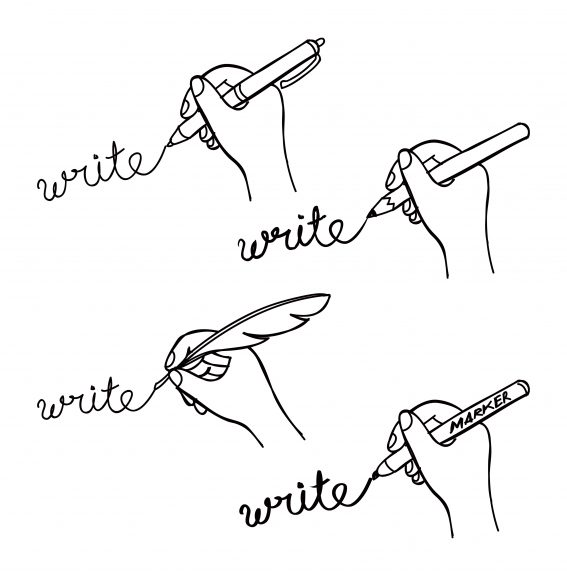Knowledge Base | Ebooks | How to Become a Better Writer? The 101 Guide
How to Become a Better Writer? The 101 Guide
Whether you’re just starting out trying writing or you’ve been writing for years, you probably want to become a better writer. No matter how many essays, short stories, or bestselling novels you’ve written, writing is always a craft that can be improved with practice. That’s why we’ve put together a guide to help you push yourself beyond your comfort zone and achieve more and more when it comes to writing.
You may think you’re a creative person and have no problem writing – but we all know it’s difficult, often frustrating, and requires constant effort. In this article, we’ll cover everything from keyword research and understanding your audience to exercises that can help improve your writing skills. We’ll explain how to become a better writer and which writing skills are worth improving, give you examples of practical advice, and explain how to use a book maker online to create an ebook, and let you publish your novel or comic book in the attractive form as the one below.
Publuu’s online ebook example
View more online ebook examples
Create your own online ebook here
So, grab a cup of coffee, get your laptop ready, and read on!
What makes a good writer?
If you want to become a “better writer,” it’s worth considering what we mean by that. A good writer knows exactly who he or she is writing for and what those people want to read.
Good writers can create content that reaches their audience because they understand and care about them as individuals and what they need. A good writer also pays close attention to details of the entire writing process, eliminating typos and other errors from the text. Remember, a professional writer also needs to work with editors and typesetters, so it’s important to make sure the writing is of the highest quality.
Improving writing skills includes things like learning how to write more efficiently, eliminating unnecessary words, learning new words, and learning how to use them effectively – not just correctly, but in a way that makes sense.
Quality writing also requires the flexibility to change one’s style and tone for different readers and purposes. This adaptability allows a writer to effectively communicate his or her ideas depending on the style of the text, whether it is a book or a blog post. Excellent writing skills also include a solid foundation in research and fact-checking, which increases the accuracy and relevance of content.
To become a good writer and improve your writing skills over time, you must always be willing to learn and grow. This includes actively seeking the opinions of others, trying new approaches to writing, and taking advantage of opportunities to improve your skills. Successful writers are also voracious readers, finding inspiration and information in books of all genres and subjects.
How long does it take to get good at writing?
It is difficult to say how much time you need to become a better writer – you may have the innate ability but no self-discipline. Others may work hard but lack the talent necessary for good writing skills. The consistent practice may bring quick improvement for some, while it may take longer for others.
However, you may be familiar with the 10,000-hour rule. It suggests that a person needs about 10,000 hours of concentrated practice in a particular area before reaching an expert level. So imagine you work 8 hours full time, and sleep 8 hours – so you set aside 2 hours each day for your own writing, practicing, editing, and so on. That means that this writing time comes down to 5,000 days … that’s 14 years, with no breaks for vacations, days off, or accidents!

Consistency in practice is the key to developing your writing skills. You can improve your writing by devoting regular time to it (daily or weekly), attending writing workshops, seeking advice from more experienced writers, and reading widely, but you won’t improve a skill without actively practicing it. Writing alone won’t help without feedback! Give your book to friends to read… if they reject it, that’s feedback too!
How to become a better writer?
Choose publishing platform
This is the first and most important step in getting your work seen by the people you want to show it to. You need to choose a venue that is conducive to your goals and attracts your target audience. A medium or personal website may be better suited for creative works or personal narratives, while a professional blog or LinkedIn may be better suited for sharing your knowledge on a specific topic.
Why Publuu is one of the best ideas for self-publishing?
One of the best ways to publish a book is to use Publuu PDF online flipbooks. This one-of-a-kind, innovative platform provides a user-friendly and cost-effective solution. With us, you can convert static PDF files into interactive online flipbooks that can be read on a variety of devices, from smartphones to desktop computers.
Publuu’s flipbook technology simulates the look and style of a physical book to provide an immersive reading experience. Readers can immerse themselves in your words by “flipping” pages with a single click or swipe like in the example below:

With the state-of-the-art hotspot feature, you can add audio and animated gifs to make your e-book even more interactive – something a paper book can’t do!
Traditional publishing is both expensive and time-consuming. You can avoid printing, shipping, and storage costs by using Publuu. The platform allows you to create and publish a flipbook with minimal effort – just publish it online and give paying customers access to the document.
Start writing daily
Make writing a daily habit, even if it only takes a few minutes. This will help you both improve your writing and develop the habit of writing every day. You can overcome writer’s block and gain momentum by making time to write every day. Famed horror author Stephen King, for example, set a goal years ago to write at least 2,000 words a day. He has written more than sixty novels and hundreds of short stories, proving the effectiveness of this routine.
Develop a habit of reading
You can’t write without reading. This will expose you to different styles, methods, and genres of writing, and will inspire and motivate you. You can pick up tips from the masters, expand your vocabulary, and better understand language and storytelling by reading a variety of works. Many writers also underline the importance of reading non-fiction: doing research, learning more about the way the world works, and practicing speaking concisely and to the point.
Apply writing skills
You can do this in a variety of ways, such as submitting your work to magazines, participating in writing contests, or even working as a freelance writer. Many freelance writers have put their skills to use by publishing guest articles on blogs and in online magazines. In this way, you will gain experience and knowledge, which will lead to better earnings and more opportunities.
You can learn effective writing techniques and develop your own style by reading and analyzing the work of other writers. You can learn a lot about what makes writing compelling by analyzing the author’s word choice, sentence structure, and narrative flow. Many of the writers you meet in school can inspire your own development.
Develop the tone of voice
Establishing a consistent tone in your writing makes your work more recognizable to readers. A distinctive tone can help you connect with your audience and communicate your message more effectively. For example, Terry Pratchett is known for his sense of humor and numerous footnotes. His unique tone sets him apart from other writers and has earned him loyal readers who appreciate his wit and storytelling skills.
Do your research
You can’t write books without the right knowledge. Whether you write fiction or nonfiction, you need to read a lot about how the world works. Taking the time to research a topic shows your commitment to providing valuable information and ensures that your writing is credible and reliable. Rebecca Skloot, author of “The Immortal Life of Henrietta Lacks,” spent more than a decade researching the life and legacy of Henrietta Lacks and the ethical issues surrounding the use of her cancer cells in research.

Understand the ideas behind your work
Thinking about your motivations and the message you want to convey can help you focus your writing and make it more meaningful to your readers. Answer the questions: What are you trying to say? Is your work an allegory? Do you want to talk about issues like race, gender, and identity? By understanding and expressing the ideas behind stories, you can create thought-provoking narratives.
Join a writing workshop or course
Attending a writing workshop or finding a writing teacher can help you improve your skills, receive constructive feedback, and connect with other writers. These opportunities provide a structured environment for learning and development, as well as access to valuable resources and guidance from experienced professionals.
Be open to criticism
Accepting constructive criticism is essential for any writer who wants to improve their craft. Seek feedback from peers, mentors, and even readers to learn what areas of your writing may need improvement. Being open to criticism also demonstrates humility and a willingness to learn, which are key qualities for any successful writer.
How can I improve my writing skills?
Apart from the guidelines on how to become a better writer above, many ideas can help you improve your writing skills. Here are some ideas that can help you develop a great writing style!
-
Edit and revise: Review and refine your work multiple times to improve clarity, coherence, and overall quality.
-
Study grammar and style: Familiarize yourself with grammar rules and stylistic guidelines such as the one published in Strunk and White Elements of Style to produce well-structured, good writing.

-
Analyze successful writers: Delve into the works of accomplished authors to identify effective writing techniques and strategies. Don’t just copy them, but learn what makes them effective and what speaks to you!
-
Set clear goals: Outline specific objectives for each writing project to maintain focus and ensure your message is effectively conveyed. You can assume that you can churn out X words per day, or write for half an hour every day.
-
Experiment with different styles: Practice writing in various formats, tones, and voices to develop versatility and discover your unique style.
-
Use writing prompts: Employ writing prompts or exercises to challenge yourself, spark creativity, and overcome writer’s block. You can find such challenges online or on forums for writers, like Reddit!
-
Maintain a writing journal: Document your thoughts, ideas, and experiences to develop a habit of self-reflection and enhance your writing skills. It’s a good point to begin writing down some of the ideas in a special notebook or using an app like Evernote.
-
Network with other writers: Connect with fellow writers to exchange ideas, share experiences, and gain inspiration. During events like Nanowrimo, you can meet with amateur and professional writers to learn how to become better writer and what their writing process looks like!
-
Make use of various online resources: Take advantage of the wealth of writing resources available online, such as blogs, webinars, podcasts, and articles. Subscribe to an online writing course, whether a free one or using a web service like Lynda or Udemy!
-
Practice storytelling: Hone your narrative skills by focusing on plot, character development, and pacing in your writing. If you can’t find a writing class, try learning improv to learn how to improve your storytelling skills!
-
Use outlines and mind maps: Organize your thoughts and ideas using outlines or mind maps to create a clear structure for your writing.
-
Stay persistent: Be patient with your progress and remain dedicated to continuous improvement in your writing journey.
-
Observe and listen: Pay attention to the world around you, including conversations and experiences, to gather inspiration and enrich your writing. Use catchphrases you hear and note down unusual expressions!
-
Write for different audiences: Practice tailoring your writing to various target audiences to enhance adaptability and communication skills.
-
Expand your vocabulary: Regularly learn new words from things like “new word a day” calendars and incorporate them into your writing to enhance precision and expressiveness.

-
Learn about self-publishing: Self-publishing is a great way to bring your publications to life on your own terms. There are a lot of advantages of self-publishing that you can apply to your own work.
-
Join writing challenges or contests: Participate in writing challenges or contests to push your boundaries, test your skills, and gain exposure. Try events like Nanowrimo or other competitions organized by local school boards or libraries!
-
Eliminate distractions: Create a dedicated writing space free of distractions to increase focus and productivity. We can recommend the Pomodoro technique – 25 minutes of focused work, 5 minutes of a break!
-
Use the active voice: Write in the active voice to create more engaging, dynamic, and direct prose.
-
Avoid clichés: Clichés are overused expressions that pop up in language, for instance “, indistinct chattering” or “baby feet”. Instead, use original, creative language to make your writing more compelling.
-
Learn from your mistakes: Analyze past errors or weak points in your writing and use them as learning growth opportunities.
What do good writers have in common?
Good writers have many qualities that contribute to their success, and one of the most important is a good command of language. If you want to be a good writer, you need to communicate effectively and know grammar, syntax, and vocabulary inside out. However, good language means little if you don’t have ideas – you must have creativity, have fresh ideass and address topics from novel perspectives.
To make their writing engaging and relatable, successful writers must cultivate empathy and emotional intelligence, allowing them to connect more deeply with readers. Readers want to see themselves in the protagonist and experience adventures and emotional ups and downs with them.
It can also be said that great writers have a strong sense of purpose and passion for their craft, which motivates them to share their stories and ideas with the rest of the world. Whether you’re writing a children’s book , a love story, or a sci-fi novel, you need to feel what the reader should feel!
These common traits, in addition to their individual strengths and weaknesses, often form the basis of a writer’s successful career, setting them apart as excellent authors.
Summary
In essence, becoming a better writer is a continuous process that involves dedication, persistence, and a genuine passion for the craft. By applying the strategies mentioned in this thread, one can improve their writing skills, develop a unique voice, and ultimately reach a wider audience with their work. Embrace the journey and remember that progress and growth come with practice and patience.
You may be also interested in:
Chapbook – a Complete Guide on How to Make & Publish It
How To Convert PDF To Ebook?
Convert your PDF to flipbook today!
Go beyond boring PDF and create digital flipbook for free.
Register with Publuu for free today and check out all the smart options we prepared for you!






